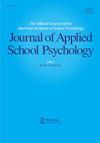An Examination of Interventionist Implementation Fidelity and Content Knowledge as Predictors of Math Intervention Effectiveness
IF 1.5
Q4 PSYCHOLOGY, EDUCATIONAL
引用次数: 3
Abstract
Abstract Data from a large-scale math intervention program were used to evaluate the degree to which implementation fidelity (IF) and interventionist content knowledge were associated with student outcomes. Data were available for 33 interventionists serving 658 students in Grades 4–6 across one school year. A series of multilevel models were fit to the data to evaluate the impact of procedural IF and interventionists’ math content knowledge on students’ postintervention achievement, controlling for preintervention achievement and intervention dosage. Higher student posttest scores were observed for interventionists with an average fidelity rating of 95% or greater (β = .15); however, no effects on students’ math achievement scores were observed for interventionist content knowledge. Adding IF and a measure of interventionist content knowledge to the model explained a statistically significant amount of variance in growth estimates attributable to interventionists (15%). Results highlight the potential importance of ongoing evaluation and remediation of IF in the context of standardized supplemental intervention in math, while also providing some evidence that higher levels of content knowledge may not translate into greater impact in a standard-protocol intervention setting. Results suggest a need for more research examining characteristics of interventionists and aspects of implementation that may account for variance in student outcomes.作为数学干预效果预测指标的干预者实施保真度和内容知识的检验
摘要使用来自大规模数学干预项目的数据来评估实施保真度(IF)和干预主义内容知识与学生成绩的关联程度。有33名干预者的数据,他们在一个学年内为658名4-6年级的学生提供服务。一系列多层次模型适用于数据,以评估程序IF和干预者的数学内容知识对学生干预后成绩的影响,控制干预前成绩和干预剂量。干预主义者的学生后测得分较高,平均保真度评分为95%或更高(β = .15) ;然而,干预主义内容知识对学生数学成绩没有影响。在模型中添加IF和干预主义内容知识的衡量标准,解释了干预主义者在增长估计方面的统计学显著差异(15%)。结果强调了在数学标准化补充干预的背景下对IF进行持续评估和补救的潜在重要性,同时也提供了一些证据,证明在标准协议干预环境中,更高水平的内容知识可能不会转化为更大的影响。研究结果表明,有必要对干预主义者的特征和可能导致学生成绩差异的实施方面进行更多的研究。
本文章由计算机程序翻译,如有差异,请以英文原文为准。
求助全文
约1分钟内获得全文
求助全文
来源期刊

Journal of Applied School Psychology
PSYCHOLOGY, EDUCATIONAL-
CiteScore
2.40
自引率
10.00%
发文量
7
期刊介绍:
With a new publisher (Taylor & Francis) and a new editor (David L. Wodrich), the Journal of Applied School Psychology will continue to publish articles and periodic thematic issues in 2009. Each submission should rest on either solid theoretical or empirical support and provide information that can be used in applied school settings, related educational systems, or community locations in which practitioners work. Manuscripts appropriate for publication in the journal will reflect psychological applications that pertain to individual students, groups of students, teachers, parents, and administrators. The journal also seeks, over time, novel and creative ways in which to disseminate information about practically sound and empirically supported school psychology practice.
 求助内容:
求助内容: 应助结果提醒方式:
应助结果提醒方式:


